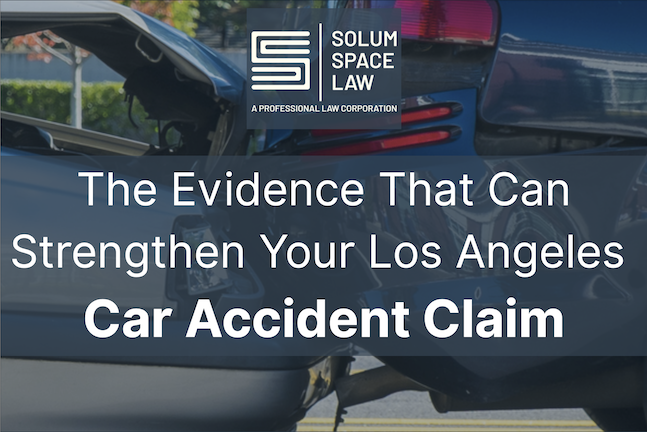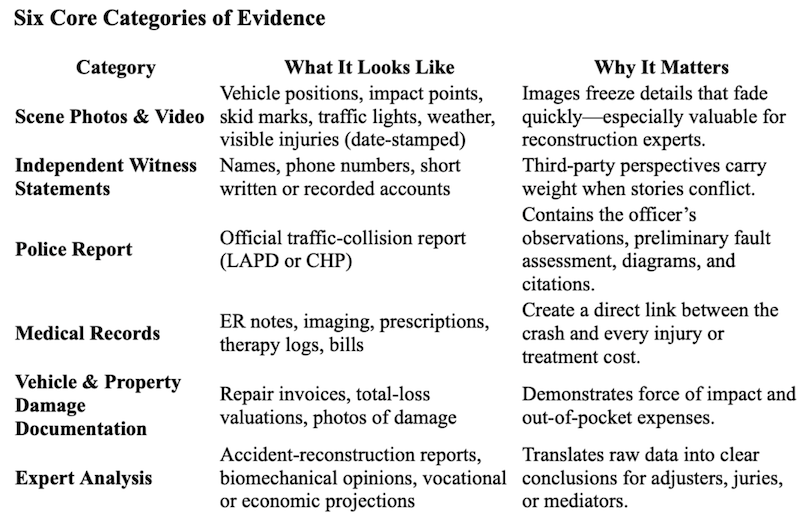The Evidence That Can Strengthen Your Los Angeles Car-Accident Claim
The following article is provided by Solum Space Law, APC for general information only and should not be taken as legal advice. Every collision is unique—if you have questions about protecting your rights after a crash in Southern California, call our office for a free consultation.
A serious traffic collision can leave you facing medical bills, missed paychecks, and a thicket of insurance paperwork. California’s fault-based system means the driver (or drivers) who caused the crash—and their insurers—must compensate those who were harmed. But insurers pay only when the facts are clear.
Below is a snapshot of the key proof our firm looks for when we build a car accident case, along with tips for preserving it and common missteps to avoid.
Why “Paper (and Pixels) Win the Day”
1. Establishing Liability
Photos, witness testimony, data downloads, and police diagrams can show exactly who violated a traffic law or acted negligently.
2. Valuing Damages
Medical charts, wage statements, and repair estimates translate your losses into dollars.
3. Meeting California’s Comparative Fault Rules
If you are even 10 % at fault, your award is cut by 10 %. Solid proof minimizes finger-pointing and protects your bottom line.
Gathering Evidence When You’re Shaken—or Stuck in a Hospital Bed
At the Scene (if safe):
Move vehicles out of traffic if possible; call 911.
Photograph everything before tow trucks arrive.
Exchange ID and insurance—no apologies or statements of fault.
Politely collect witness info.
Soon After:
Seek medical evaluation the same day—even for “minor” aches.
Save clothing and personal items; they can corroborate injury severity.
Notify your own insurer but decline recorded statements until you speak with counsel.
Unable to Act?
Family members—or your attorney—can request surveillance footage from nearby businesses, order police body-cam videos, and send preservation letters (called “spoliation” letters) to parties who hold key evidence, such as truck-driver logbooks or vehicle event-data recorders (“black boxes”).
Mistakes That Undermine Your Claim
Skipping or delaying medical care
(“I’ll wait to see if the pain goes away.”)
Solution: get checked the day of the crash.
Admitting fault or apologizing
Solution: exchange info only—let evidence speak.
Relying solely on the police report
Solution: gather your own photos/witnesses.
Posting accident details online
Solution: set accounts to private and stay silent about the crash.
Negotiating without counsel
Solution: at least consult an attorney before signing any release.
What Solum Space Law Can Do for You
Rapid Evidence Preservation – We send spoliation letters within 24 hours of engagement.
Accident-Scene Investigation – Our network can retrieve nearby CCTV footage before it is overwritten.
Medical-Records Coordination – We obtain, organize, and itemize every bill and chart.
Expert Alignment – When needed, we retain reconstructionists, physicians, and economists who can testify with authority.
Negotiation & Litigation – We shoulder the insurer interactions so you can focus on healing; if a fair settlement isn’t offered, we are prepared to file suit.
Injured in Los Angeles? Protect Your Claim Today.
Evidence degrades—but your right to fair compensation doesn’t have to. Call (310) 405-0014 or complete our online form for a free, no-pressure case evaluation. Solum Space Law fights to turn the chaos of a collision into a well-documented claim for the recovery you deserve.
This blog is attorney advertising. Prior results do not guarantee a similar outcome. Solum Space Law represents clients throughout California.



